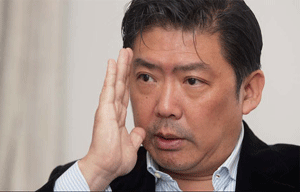Number of expatriates on the rise
Updated: 2011-10-17 07:56
By Yang Ning (China Daily)
|
|||||||||
|
|
More people head to China seeking out job opportunities as Western economies suffer hardship
BEIJING - To hear him on the telephone, you would think Johan Bjorksten was Chinese born and bred. But it's that name. It gives away his Swedish roots.
Bjorksten is not just fluent in Putonghua, he knows many Chinese idioms and old sayings. Having lived and worked in the country for 25 years and run his own business for the past 17, he has inevitably picked up a nickname. It's "Dalong" and means "big dragon" - a reference to the year in which he was born, 1964.
An increasing number of foreigners are being attracted by China's prosperous economy and have come to work in the country. Figures released by the Ministry of Human Resources and Social Security showed that 231,700 foreigners were employed in China at the end of 2010, compared with 223,000 in 2009.
"When I first came to China in 1986, it was a rather poor and undeveloped country. My reason for choosing to start my career in China was that I saw opportunities here. In my opinion, this is a country full of opportunities," said the Swede.
"Also, I have never felt like I was being excluded from anything. I've always felt very comfortable and it's easy for me to live here."
Foreigners are finding jobs in China on the back of its strong economy, which is performing vastly better than that of the United States or Europe, said Carter Yang, managing director of Robert Walters Talent Consulting Ltd China.
"This year, China's average gross domestic product increase is about 8 to 10 percent. This has created more opportunities, especially within the financial services, pharmaceutics as well as the retail industry," said Yang.

"The country provides an abundance of bigger career platforms and opportunities. We have witnessed both international investment companies and local Chinese companies focusing on expansion plans within the past decade. Besides the strong need for international talent to grow their businesses in China, they also require top-tier candidates for their businesses in international markets."
The talent consultant added there was a rising trend for local Chinese companies capable and willing to offer international compensation packages and benefits that are targeted for expatriates working in China.
Helen Fung, managing consultant of recruiting company SHL Group Ltd China, shared the same view.
"Talent mobility across national borders is a common practice that most multinationals in China are experiencing today. At the same time, more Chinese national and private enterprises are expanding internationally and need to recruit top talents from different parts of the world," she said.
Fung pointed out that managing skilled people from other cultures posed a special challenge to companies because it is essential to be fair and culturally sensitive to both nationals and expatriates, especially given that talent management is the top priority for most chief executive officers today.
"Respect is essential in a multicultural environment, and employers should open up to different ideas," she said.
Chinese bosses should firstly pay more attention to the recruitment process when hiring foreign employees, according to Fung.
It is imperative that Chinese employers are familiar with company policies and impart their knowledge to prospective foreign employees during interviews and orientation sessions. In this way, foreign employees will understand the company's expectations and can avoid many of the pitfalls caused by misunderstanding and cultural confusion.
Fung added that in day-to-day management, in addition to providing a better job development platform and a clear career path, Chinese bosses should always keep two words in mind: equality and respect.
Equality means to guarantee equal treatment not only between Chinese and foreign employees, but also between Chinese bosses and foreign employees. It means implementing company policies and procedures consistently so all employees feel that they are treated fairly and equally.
Chinese managers should make an effort to learn the social cultures of their foreign workers and how best to communicate with them, said Fung.
China Daily
(China Daily 10/17/2011 page16)











